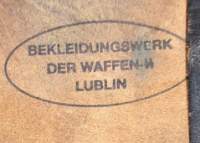Extracts from the interrogation of POW Heinrich Gustav Wilhelm Wied,
dealing with the Bekleidungswerk Lublin, December 1943 Ė April 1944.
Wied was born in
Oschersleben on
9 June 1909.
He was a
Kripo (Criminal Police) official with the rank of an
SS-Hauptsturmführer.
The
Bekleidungswerk Lublin had been set up to collect and make use of property removed from prisoners
entering KZ Lublin
(
Majdanek). It also served the
Arbeitslager
Pulawy and several other camps in the Lublin area.
The
Bekleidungswerk Lublin used 3 hangars at the disused Lublin airfield as warehouses and employed a
staff of some 70 SS men. The responsible authority was the
Reichskanzlei in
Berlin, Voss-Straße 4.
Wied established that the German
Stiftung für Anstaltspflege (the
euthanasia organization "T4") was responsible for the
liquidation of Jews in the concentration camps and mental ill inmates of asylums. This activity bore
the cover-name
"
Aktion Reinhard". The leading persons were
Oberregierungsrat
Allers, SS-Sturmbannführer
Wirth, and
SS-Hauptsturmführer
Hering. The then police chief of Lublin,
SS-Gruppenführer
Globocnik, was equally responsible.
 |
| Pistol Holster from Lublin |
Wiedís investigations in Lublin established that 18 SS men, mainly on the
Bekleidungswerk staff, were guilty of corruption on a large scale. Throughout his enquiries
Wied had to combat deliberate obstruction from the higher
Sipo/SD leaders, because they themselves
were also deeply implicated. For example, the aforementioned
Allers intervened
on behalf of one of the accused SS men in whose possession Wied found a large quantity of obviously
stolen jewellery and clothing, etc., in that
Allers declared that the accused
had taken the articles with the authority of the
Stiftung.
The cases against the 18 accused were heard before the
SS und Polizeigericht
in
Kassel. Sentences up to 3 years imprisonment were imposed but in several
cases no verdict could be reached since the defendants were absent, allegedly on front-line service.
The resentment against Wiedís interference in this profitable "racket" in Lublin found expression
in a variety of ways. On one occasion he found the tyres of his car slashed, on another occasion
sugar was placed in the car's petrol tank.
Murder Camp Lublin:
Attached to the
KZ Lublin (Majdanek) was a crematorium which Wied personally
visited. It was a single storey building containing the mortuary, about 6 ovens and the living quarters of the
attendant,
SS-Oberscharführer Musfeld. With the wind in the right
direction the stench in Lublin, 6 km distant, was nauseating. Apparently the victims were mainly
delivered by truck, executed (Wied believes by shooting), and then cremated.
Wirth and
Hering played a prominent
part in the killings. A certain
Schott, from whom Wied has this
information, had heard them openly boasting about it.
Obstructionists: The staff of the
Bekleidungswerk Lublin came under the command
of the
SS Standortkommandant,
SS-Sturmbannführer
Wippern.
This man showed no inclination to support Wied in his investigations, the probable reason being that he was too
deeply involved in corruption himself. There was no check of or receipt for property removed
from prisoners. It was obvious from the lavish spending and extravagant living of the staff of
both the KZ and the
Bekleidungswerk, that this must be their main source of income.
Allers also did his utmost to impede the subject's inquiries,
for example, in connection with a house search at the homes of
SS-Sturmscharführer
Rottenfüsser and another SS man, both in the town of
Dachau.
Wied discovered a quantity of property, stolen from prisoners.
Allers,
probably prompted by
SS-Sturmbannführer Wirth, shielded the
thieves by officially stating that they had the permission of his organisation
Gemeinnützige
Stiftung für Anstaltspflege to take the goods.
Wied commented on various members of the SS in Lublin:
SS-Rottenführer Ernst Gollack, born in
1915 (?), 176 cm tall,
stocky build, round full face, fair hair, who had a family in
Katowice (Kattowitz).
He was a pre-war KZ-guard, since
1940 in Lublin, at first in
Majdanek, later in the
Bekleidungswerk. He was suspected of theft.
SS-Oberscharführer Winkler,
in
1943 employed in the
Bekleidungswerk. Wied searched his house near
Kochel, Bavaria, but found nothing.
SS-Sturmbannführer Wippern, leader of the
Standortkommandantur in Lublin. At least tolerated and probably had a share in the theft
of prisoners' property in the
KZ Lublin (Majdanek).
Source: PRO / WO 309/521
© ARC 2004







